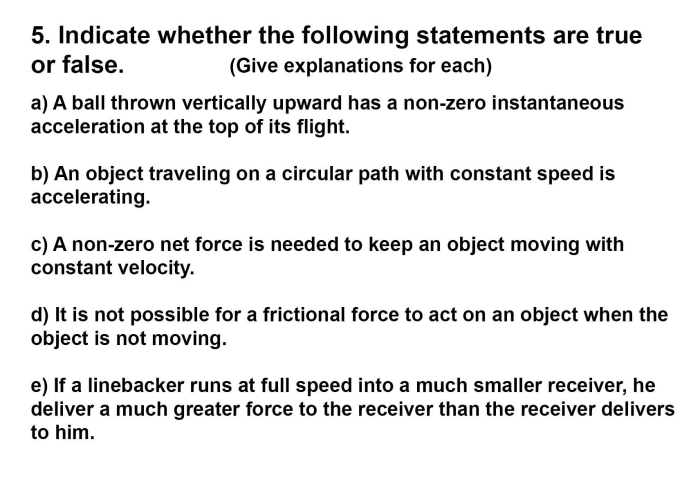Which of the following statements is true of self-awareness? This intriguing question opens a gateway to understanding the intricate tapestry of the human psyche. Self-awareness, the multifaceted ability to recognize, understand, and evaluate one’s own thoughts, feelings, and behaviors, is a cornerstone of personal growth, emotional intelligence, and overall well-being.
Delving into the depths of self-awareness, we embark on a journey that explores the cognitive and emotional components that shape our perception of ourselves. From introspection to social interactions, we unravel the theories and perspectives that illuminate the development and assessment of self-awareness.
Its profound impact on decision-making, goal pursuit, and mental health highlights the significance of cultivating this essential aspect of human consciousness.
Self-Awareness: Defining the Concept

Self-awareness encompasses a multidimensional understanding of one’s thoughts, feelings, motives, and behaviors. It involves both cognitive and emotional components, enabling individuals to introspect, reflect, and make informed choices.
Cognitive self-awareness refers to the ability to identify and articulate one’s thoughts, beliefs, and values. It allows individuals to understand their own cognitive processes, strengths, and weaknesses.
Emotional self-awareness, on the other hand, pertains to the ability to recognize and regulate one’s emotions. It involves being attuned to one’s feelings, understanding their causes, and responding to them in a healthy and adaptive manner.
Self-awareness is crucial for personal growth, interpersonal relationships, and overall well-being. It enables individuals to make informed decisions, manage their emotions effectively, and navigate social situations successfully.
Theories and Perspectives on Self-Awareness
Various theories have been proposed to explain the development of self-awareness. One prominent theory is the social cognitive theory, which suggests that self-awareness emerges through social interactions and the internalization of societal norms and expectations.
Another perspective is the introspective theory, which emphasizes the role of internal reflection and introspection in the development of self-awareness. Individuals engage in self-examination, analyzing their thoughts and feelings to gain a deeper understanding of themselves.
Social interactions play a crucial role in shaping self-awareness. Through interactions with others, individuals receive feedback and compare themselves to others, leading to a more nuanced understanding of their own strengths and weaknesses.
Methods for Assessing Self-Awareness
Researchers use various methods to measure self-awareness. One common approach is the Self-Awareness Scale (SAS), which assesses individuals’ ability to identify and describe their own thoughts, feelings, and behaviors.
Another method is the Interpersonal Reactivity Index (IRI), which measures empathy and perspective-taking abilities, which are key components of self-awareness.
Self-report measures, such as questionnaires and interviews, are widely used to assess self-awareness. However, these methods rely on individuals’ self-perceptions and may be subject to biases.
Impact of Self-Awareness on Behavior and Well-being
Self-awareness has a profound impact on decision-making and goal pursuit. Individuals with high self-awareness are more likely to make informed choices, set realistic goals, and persist in the face of challenges.
Self-awareness is also strongly linked to emotional regulation. Individuals who are aware of their emotions can better manage their responses, avoid impulsive behavior, and cope with stress more effectively.
Furthermore, self-awareness is a key factor in promoting mental health and well-being. It allows individuals to identify and address negative thoughts and behaviors, leading to increased self-esteem, resilience, and overall life satisfaction.
Self-Awareness in Different Contexts, Which of the following statements is true of self-awareness
Self-awareness manifests in various social, cultural, and occupational settings.
- In social interactions, self-awareness allows individuals to understand their own social cues and respond appropriately, fostering positive relationships and effective communication.
- In cultural contexts, self-awareness is influenced by societal norms and values. Individuals may adapt their self-perceptions and behaviors to fit cultural expectations.
- In occupational settings, self-awareness is crucial for career success. It enables individuals to identify their strengths and weaknesses, set career goals, and navigate workplace dynamics effectively.
Enhancing Self-Awareness: Techniques and Strategies
Cultivating self-awareness is an ongoing process. Several techniques can be employed to increase self-awareness.
- Self-reflection:Engaging in regular self-examination, journaling, or meditation to explore one’s thoughts, feelings, and behaviors.
- Mindfulness:Paying attention to the present moment without judgment, allowing for greater awareness of one’s inner experiences.
- Feedback:Seeking feedback from trusted sources, such as friends, family, or mentors, to gain external perspectives on one’s strengths and areas for improvement.
By practicing these techniques, individuals can enhance their self-awareness and reap its numerous benefits for personal growth, interpersonal relationships, and overall well-being.
Answers to Common Questions: Which Of The Following Statements Is True Of Self-awareness
What is the key difference between self-awareness and self-consciousness?
Self-awareness involves a balanced and objective understanding of oneself, while self-consciousness often implies a preoccupation with how one is perceived by others, leading to feelings of anxiety or insecurity.
How can I improve my self-awareness?
Engaging in self-reflection, practicing mindfulness, seeking feedback from trusted sources, and journaling can effectively enhance self-awareness.
What are the benefits of having high self-awareness?
High self-awareness promotes emotional regulation, improves decision-making, fosters stronger relationships, and contributes to overall psychological well-being.


